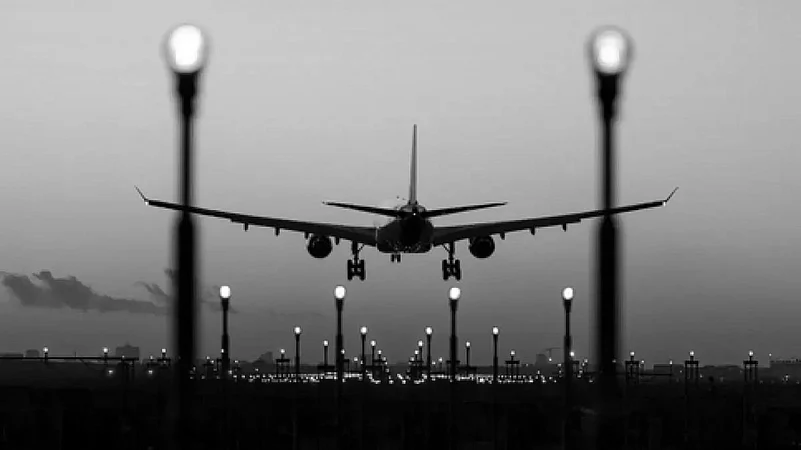India on Wednesday had announced closing its airspace for aircraft registered in Pakistan and those operated, owned or leased by Pakistani airlines from May 1 to May 23, amid escalating tensions between the two neighbouring countries following the Pahalgam terror attack. The restriction -- applicable to both commercial as well as military aircraft – was issued as a NOTAM (Notice to Airmen) by the Ministry of Civil Aviation.
India’s decision followed a similar ban by Pakistan. Following the suspension of the Indus water treaty by the Indian government last week, the neighbouring country had announced shutting down its airspace. With access to Pakistan airspace closed, Indian airlines are now estimated to be incurring an additional Rs 77 crore per week or around Rs 306 crore per month due to rerouting. A similar ban was put in place following the Pulwama attack in 2019, and the restriction by the Pakistan government had remained in place till May 2023 from 2019. The ban costed around $64 million to airlines, including Air India and IndiGo, in just six months following the ban, Reuters reported, citing government estimates.
Navigating Different Routes
As per an estimate by aviation analytics firm Cirium, flights operated by Pakistan International Airlines will be impacted. Pakistan’s largest air carrier operates six flights on a weekly basis to fly to Kuala Lumpur via Indian airspace. Post the Pahalgam attack, PIA has already rerouted its aircraft, according to Business Standard. PIA instead has been flying over China, Laos and Thailand to arrive in Kuala Lumpur.
“Evidently, this will lead to delaying many PIA flights by one to two hours...This measure [Indian government’s decision] will exacerbate the economic pressure on the undersized PIA with a modest fleet of 32 aircrafts,” Chief Economist, Infomerics Valuation and Ratings, Manoranjan Sharma said in a statement.
However, Pakistan’s ban on Indian carriers using its airspace is expected to have a significant impact. Indian airlines, including Air India and IndiGo, used Pakistan’s airspace for the over 800 weekly international flights from North India. Now, these airlines are exploring alternate air routes that link India to Europe, North America, Central Asia and the Middle East.
Consequently, IndiGo has temporarily cancelled flights to Almaty and Tashkent due to aircraft operational range restrictions from April 27 until May 7. The airline, in a statement last week, mentioned that around 50 international flights operated by it will require longer travel duration.
Consequently, the increase in travel time will surge fuel consumption and is likely to require a greater number of technical stops.
Other Indian airlines like Air India Express, SpiceJet, and Akasa Air haven’t made any official announcement regarding schedule changes, but they are likely to face similar challenges.
Operational Cost Soars
Indian airlines are now incurring an additional Rs 77 crore per week or around Rs 306 crore per month due to rerouting, a PTI report highlighted. This has also resulted in longer travel time, for example, a 16-hour flight to North America now takes an extra 1.5 hours with additional operational costs per trip estimated to be somewhere around Rs 29 lakh. Flights from India to Europe are reportedly likely to cost Rs 22.5 lakh per trip more.
Tata Group’s airline, Air India, has estimated a loss of around $600 million if Pakistan’s airspace remains closed for a year, Reuters reported. The salt-to-power conglomerate’s airline has asked the government to step in to ease the economic impact on its airline business and has reportedly asked to implement a “subsidy model”.
The government is reportedly likely to hold talks with China to seek permission to use its airspace to minimise trouble. It is also reportedly considering tax exemptions.
“Airlines have been asked to assess these new routes, and if viable, the government will seek China’s permission,” the Economic Times reported, citing a source.
The government of India is reportedly planning to move to the International Civil Aviation Organisation (ICAO), claiming the airspace ban by the neighbouring country goes against the principles of international air transportation.
Air Freedom & Airlines Biz
The operations of airlines across different countries are made possible by internationally recognised rights, known as “freedoms of air”, that govern the operations of commercial air services between different countries. These rights require a seamless relationship between these countries to facilitate operations. However, tensions between the relations of two countries may disrupt these rights, affecting airline operations and travellers’ plans.
ICAO’s Freedoms of the Air
Just as the government has exclusive sovereign rights over the use of land and water within the geographical boundaries of its country, a similar privilege exists over its airspace. The International Civil Aviation Organisation guarantees certain freedoms of the air to ensure the free flow of air transportation across the globe. To facilitate this, the United Nation’s aviation agency has laid down nine rights and the first five of them are officially recognised “Freedom of the Air”.
The first freedom gives airlines the right to fly passengers over a foreign country without landing and the second privilege allows air carriers to land in foreign countries for technical stops, including refueling. The third allows an airline to fly from the home country to a foreign country and the right to fly back from another nation to one’s own is the fourth right of the air. The fifth one ensures the right to fly passengers between two foreign countries on a flight originating or terminating in their home country. The airlines pay over fleet fees for use of airspace of the other country.
While ICAO has laid down these rights, the country in which aircraft and airlines are registered is responsible for its implementation. Both India and Pakistan are members of the ICAO.




























